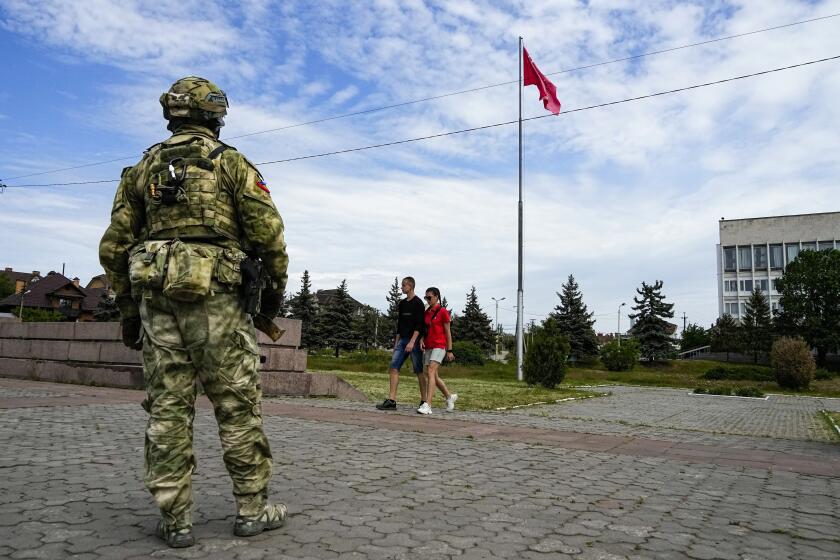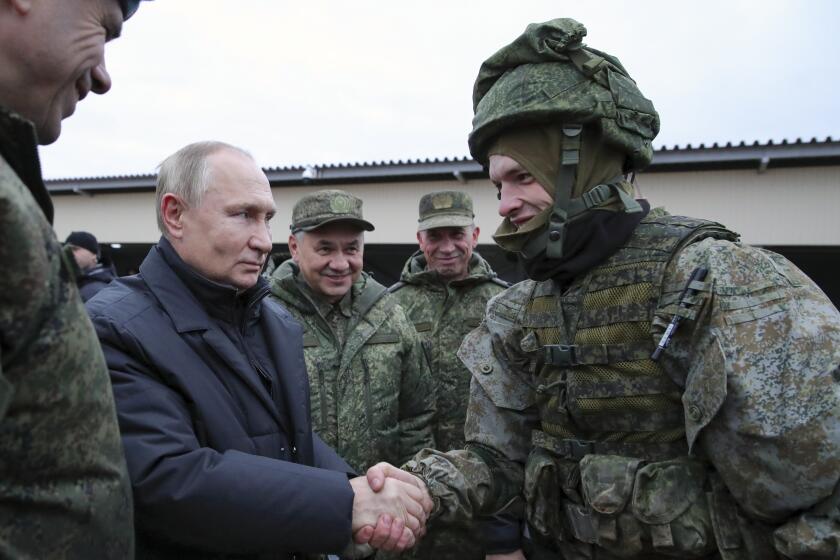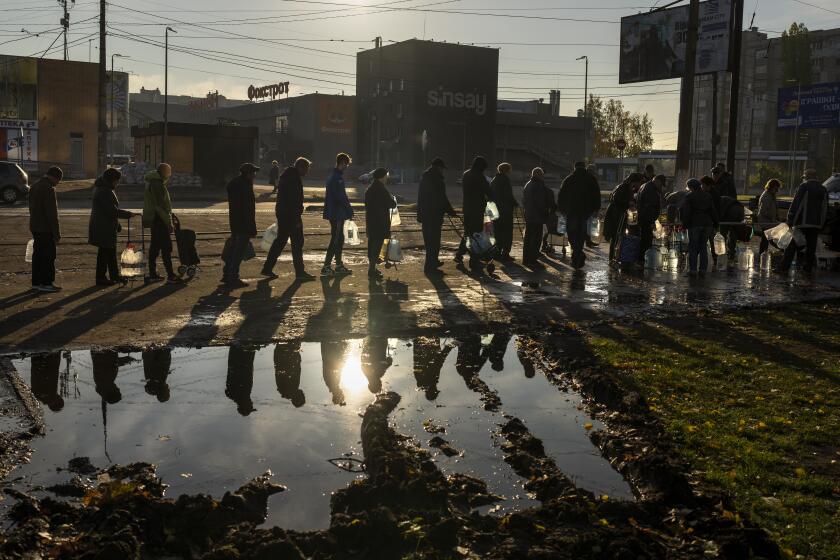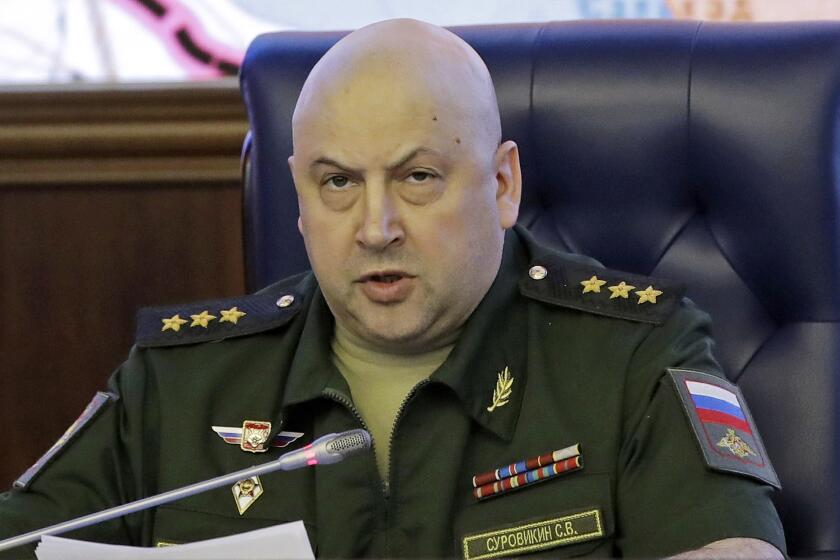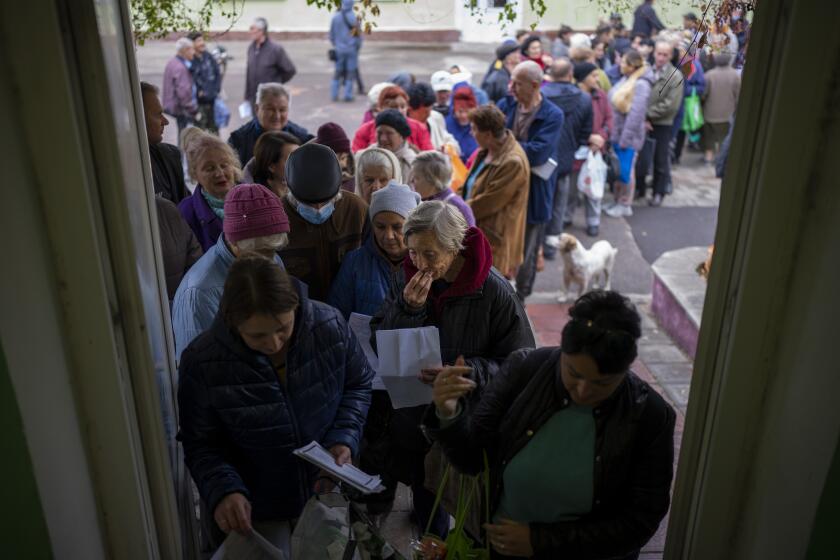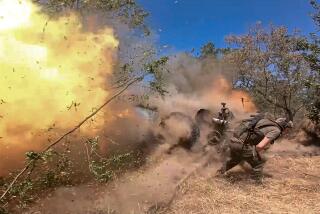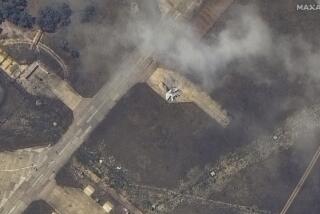Russian-installed officials flee Ukraine’s Kherson amid heavy fighting in south and east
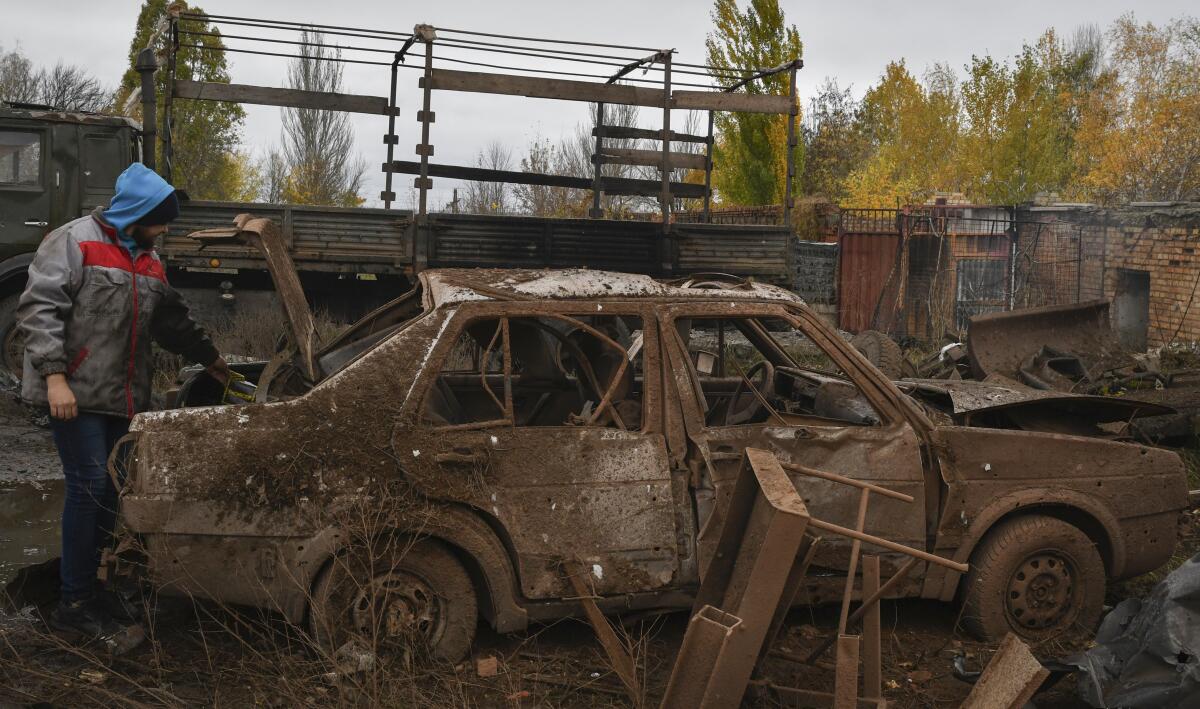
- Share via
KYIV, Ukraine — Russian-appointed authorities have fled the capital of southern Ukraine’s Kherson region along with tens of thousands of residents as Ukrainian forces pressed their campaign to recapture the city Thursday.
Fighting also intensified in eastern Ukraine as the war entered its 36th week.
Amid the battles, Moscow issued a warning that the U.S. could be drawn into the conflict, adding that Russian forces could target Western commercial satellites used for military purposes in support of Ukraine.
Russian Foreign Ministry spokeswoman Maria Zakharova accused the U.S. of pursuing “thoughtless and mad” escalation. She said Washington should take a more responsible approach, like that shown during the 1962 Cuban Missile Crisis, when the Cold War superpowers stepped back from the brink of nuclear confrontation.
Ukraine has pushed ahead with a counteroffensive to reclaim the Kherson region and its capital of the same name, which Russian forces captured during the first days of the war.
More than 70,000 residents from the Kherson city area have evacuated in recent days, the region’s Kremlin-installed governor, Vladimir Saldo, said Thursday.
Ukrainian forces pressing a counteroffensive in the south have zeroed in on Kherson, a strategic city seized by Russia in the early days of the war.
Members of the Russia-backed regional administration were included in the evacuation, the deputy governor, Kirill Stremousov, said. Monuments to Russian heroes were moved, along with the remains of Grigory Potemkin, the Russian general who founded Kherson in the 18th century, which were kept at the city’s St. Catherine’s Church.
Ukrainian forces were surrounding Kherson from the west and attacking Russia’s foothold on the west bank of the Dnieper River, which divides the region and the country.
In eastern Ukraine, Russian forces continued to bombard the city of Bakhmut in the Donetsk region, making slow gains toward the center.
Amid the heavy combat on two fronts, Russian officials stepped up warnings that the West could become part of the conflict.
Independent media outlets, human rights activists and the draftees themselves have painted a bleak picture of Russia’s partial military mobilization.
“The more the U.S. is drawn into supporting the Kyiv regime on the battlefield, the more they risk provoking a direct military confrontation between the biggest nuclear powers fraught with catastrophic consequences,” said Zakharova.
“Washington now keeps upping the ante, apparently believing that it’s capable of controlling the escalation,” she said.
The deputy head of Russia’s delegation to a United Nations arms-control panel, Konstantin Vorontsov, described the use of U.S. and other Western commercial satellites for military purposes during the fighting in Ukraine as “extremely dangerous.”
“The quasi-civilian infrastructure could be a legitimate target for a retaliatory strike,” Vorontsov warned without elaborating.
Ukrainian authorities are claiming increasing success in shooting down Iranian-built drones launched by Russia to terrorize the public.
As they have all month, Russian forces carried out attacks on Ukraine’s energy infrastructure, which have caused increasing worry ahead of winter.
A Russian drone attack early Thursday hit an energy facility near the capital, causing a fire, said Kyiv regional Gov. Oleksiy Kuleba. He said in a video statement that the latest attacks inflicted “very serious damage.”
“The Russians are using drones and missiles to destroy Ukraine’s energy system ahead of the winter and terrorize civilians,” Kuleba said in televised remarks.
Kuleba announced new rolling blackouts and urged consumers to save power. He said authorities were still pondering the specifics of the blackouts needed to restore the damaged power facilities.
Gen. Sergei Surovikin is driving Russia’s new military strategy in Ukraine, which includes a barrage of strikes on the country’s infrastructure.
Kyrylo Tymoshenko, deputy head of Ukraine’s presidential office, said rolling blackouts would also be introduced in the neighboring Chernihiv, Cherkasy and Zhytomyr regions.
Ukrainian President Volodymyr Zelensky has said that Russian attacks have already destroyed 30% of the country’s energy infrastructure.
In a likely response to Russia’s attacks on Ukrainian infrastructure, a power plant was attacked just outside Sevastopol, a port in the Russian-annexed region of Crimea. The plant suffered minor damage in a drone attack, according to city leader Mikhail Razvozhayev.
Razvozhayev said electricity supplies were uninterrupted.
Russian news reports say many of those called up under Putin’s mobilization of 300,000 reservists haven’t been provided with basic equipment.
Crimea, a region slightly larger than Sicily that Russia annexed from Ukraine in 2014, has faced drone attacks and explosions amid the fighting in Ukraine. In a major setback for Russia, a powerful truck bomb blew up a section of a strategic bridge linking Crimea to Russia’s mainland Oct. 8.
A senior Ukrainian military officer accused Russia of planning to stage explosions at the Zaporizhzhia nuclear power plant and blame them on Ukraine in a false-flag attack.
Gen. Oleksii Gromov, the chief of the main operational department of the Ukrainian military’s general staff, pointed to Moscow’s repeated unfounded allegations that Ukraine was plotting to detonate a radioactive dirty bomb as a possible signal that Moscow was planning explosions at the plant, Europe’s largest nuclear power station.
Russia took control of the Zaporizhzhia plant in the opening days of the invasion. Russia and Ukraine have accused each other of attacking the plant, whose reactors were shut down following continuous shelling.
European Union leaders have given the green light to a plan to provide Ukraine with about $18 billion in financial support over the next year.
Gromov also alleged Thursday that Russian forces may have staged explosions at residential buildings in the city of Kherson before retreating from the city “to inflict a critical damage to the infrastructure of the areas being reclaimed by Ukraine.”
The war in Ukraine and the resulting energy crisis is likely to cause global demand for fossil fuels to peak or flatten out, according to a report released Thursday by the Paris-based International Energy Agency, largely because of the fall in Russian exports.
“Today’s energy crisis is delivering a shock of unprecedented breadth and complexity,” the IEA said, releasing its annual report, the World Energy Outlook.
The blow to governments, the report said, was forcing the world’s more advanced economies to accelerate structural changes toward renewable energy sources.
More to Read
Sign up for Essential California
The most important California stories and recommendations in your inbox every morning.
You may occasionally receive promotional content from the Los Angeles Times.
